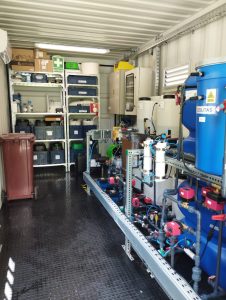Published on 11 Jul 2024
Operations have started in Spain at the Ourense’s wastewater treatment plant
WalNUT aims to transform the landscape of wastewater treatment and agricultural practices by addressing key environmental challenges. In this context, CETAQUA leads one of the two Spanish pilot sites, guided by its commitment to reducing emissions and energy consumption at wastewater treatment plants (WWTPs).
This reduction is made possible through the recovery of soluble nitrogen from waste flows, which is subsequently repurposed in the production of bio-based fertilizers. This innovative approach contributes significantly to fostering a more sustainable and environmentally friendly agricultural sector.
The pilot operates as follows:
- Reject Water Collection: The pilot collects reject water from the anaerobic digester of the WWTP. This reject water contains valuable soluble nitrogen.
- Pretreatment: Before further processing, the reject water undergoes pretreatment to remove solid particles, ensuring the purity of the extracted nitrogen.
- Nitrogen Concentration: CETAQUA’s technology is employed to concentrate the nitrogen (N) in this stream using an adsorption-desorption zeolite-based unit.
- Ammonium Salt Production: Subsequently, the concentrated nitrogen is used to produce ammonium salts using hollow fiber membrane contactors. These ammonium salts serve as a raw material in the manufacture of bio-based fertilizers (BBF).
- Bio-Based Fertilizer Production: The bio-based fertilizers consist of plant growth-promoting bacteria (PGPB), ammonium salts produced in step 4 and struvite, offering a sustainable alternative to conventional fertilizers.
By developing innovative Smart Bio-Based Fertilizers (BBF), the pilot site aims to replace non-renewable mineral fertilizers, which often do not release nutrients efficiently into the soil. The use of BBF not only enhances nutrient delivery but also aligns with growing environmental awareness, contributing to increased social acceptance of sustainable agricultural practices.
CETAQUA looks forward to demonstrating the proposed technology at a scale that brings the region closer to the real implementation of WWTPs.
In the words of Alicia González-Míguez, Project Manager at CETAQUA:
“There’s a lot of work ahead regarding the start-up of the pilot prototype but we are motivated and determined to contribute to making water treatment and agriculture more sustainable industries.”

Cover image by Kerem Karaarslan, unsplash.com
Share the news:



